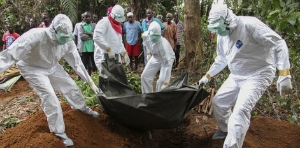The BWA has sent a total of US$20,000 to provide food, educational materials for the prevention of the spread of the Ebola virus, as well as materials and equipment to provide adequate sanitation for people affected by the crisis. It recently heard from Samuel Conteh, coordinator of social ministries for the Baptist Convention of Sierra Leone.

The outbreak began in March during the height of the farming season. With agriculture providing roughly 58 percent of Sierra Leone's gross domestic product (GDP), Mr Conteh said the Ebola scourge is affecting 'the economy of the state, communities, households and individual family members'.
'This is the time rice farmers plant their rice fields and plantation (cocoa, coffee, etc.). The outbreak has not only abruptly halted these farming activities, but has also claimed the lives of farmers.
'Some survivors are either quarantined or can no longer frequent their farms or plantations thereby leaving the crops to perish, particularly in epicentres like Kenema, Kailahun and Bo, where the majority of the population depends on rice and plantation farming for their livelihood.'
Mr Conteh said that most of the Ebola deaths have fallen within the active labour force, "leaving a huge population (children and the aged) as dependents."
As a result, there is food shortage and the price of basic food supplies has skyrocketed. There is urgent need for food, especially for Ebola survivors and orphans. Agricultural supplies for planting the next harvest are also a great need.
The mining sector, the fifth highest contributor to Sierra Leone's GDP, has also been negatively affected. Large mining companies 'have all scaled down their activities leading to mass redundancy of a massive work force. Government revenue from this sector has also gone down,' Mr Conteh affirmed.
In other areas of the economy, people have been laid off or made redundant. Education is virtually crippled as schools are closed.
The health sector is also severely affected. Approximately 50 medical personnel have died, including three prominent doctors. According to Mr Conteh, persons are fearful of visiting health facilities lest they are labeled as Ebola patients and, as a result, are dying of ailments other than Ebola. Pregnant and nursing mothers are not visiting clinics to receive necessary prenatal and postnatal care. Babies and young children are not receiving necessary immunisations to ward off other infectious diseases.
Church activities have been drastically reduced. 'Church attendances are dwindling. Baptist activities are being slowed down, particularly in [the] epicentres. The traditional embracing and handshake among members after church service have disappeared,' he said.